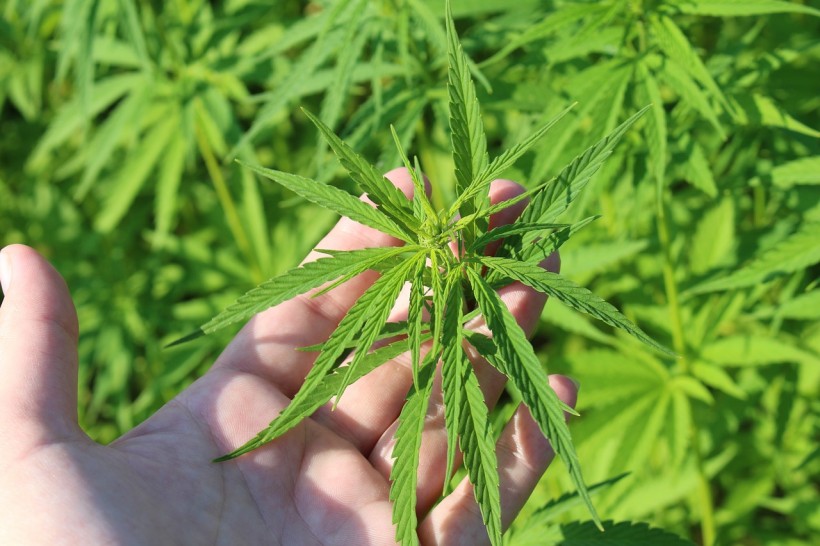There's a new cannabis commodity making a major comeback: hemp.
Although hemp isn't exactly a new player in the global economy, the industry has recently seen a surge in demand and cultivation worldwide, especially in the US. Countries globally are scrambling to cash in on growing facilities and are actively buying up land to capitalize on what looks to be a multibillion-dollar industry with no signs of slowdown in sight.
The major driving force behind this cash crop's newfound rise to fame? The chemical compound, cannabidiol, better known as the abbreviated "CBD". CBD is one of over two hundred known cannabinoids found in the Cannabis Sativa plant. This non-psychoactive compound has been purported by many to have a host of holistic health benefits. Although more research is necessary to better understand its impact on biological and physiological systems, early findings look promising. In fact, the FDA recently approved the first-ever CBD based pharmaceutical drug for epilepsy.
Hemp is a less-regulated strain of cannabis. Unlike marijuana, it has low levels of tetrahydrocannabinol, making it much easier to trade and sell across the globe even in more strictly regulated jurisdictions. Tetrahydrocannabinol, or THC, is the chemical compound in cannabis that attaches to the brain's cannabinoid receptors and influences a person's sense of pleasure, memory, concentration, and many other bodily functions. In other words, THC is responsible for the euphoric "high" often associated with marijuana.
CBD Oil Now Showing Up in Several Markets
CBD oil is popping up on digital and physical store shelves everywhere, from online retailers to big box stores. The supplement has quite literally taken the health and wellness industry by storm. The compound is touted by users and manufacturers alike as a newly discovered, all-natural way to relieve pain, inflammation and more.
Despite ongoing research and limited studies, consumers are turning up by the thousands to use CBD oil as a means of self-treatment and medication. From depression and anxiety to chronic pain and insomnia, among other ailments.
Hemp and CBD oil profitability projected to climb
The CBD and hemp industry raked in over $1 billion in 2018, up from at least $820 million in 2017 according to Market Watch. What's more, researchers estimate the hemp industry will be worth a whopping $24 billion by 2023 according to Bloomberg Business Week, a mouth-watering prospect for companies such Next Green Wave, Inc. (Next Green Wave, NGW:CSE | NXGWF:OTCQX). Next Green Wave, Inc. ranks among those early adopters who have already established a solid foothold in the industry, having positioned their brand and operations to take advantage of the rapidly evolving landscape.
A Newfound and Welcomed Opportunity for US Farmers
Traditionally, farmers grew hemp to sell for the production of items such as rope, clothing, shoes, and paper. But this next "Green Rush", reminiscent of the historic gold rush, is driven largely by the plant's high concentration of CBD oil.
Farmers across the globe are embracing the momentum of the hemp and CBD market, especially in the United States. In the US, the plant was recently declassified as a controlled substance at the federal level as part of the 2018 Farm Bill, according to Yahoo Finance.
US farmers have faced challenges in previous years, struggling to make a healthy profit from their produce due to tariffs being placed on US imports, the country's dairy crisis, and an increasing number of consumers moving away from Tabacco. Growing hemp has been a godsend for farmers looking for alternative crops, according to Forbes. The US is now importing less hemp from other countries like Canada and China, becoming a supplier, as opposed to purely a consumer, in the industry. In fact, the total number of hemp imports to the US decreased to $67.3 million in 2017 from $78.1 million in 2015 according to Forbes.
Analyst Projections and Trends
Analysts predict Cannabis' underdog-strain, hemp, will surpass its cousin marijuana in annual sales because of the rising demand for CBD oil. Investors think so too and many are putting their money into growing and extraction facilities waiting for the moment larger corporations start putting CBD oil into their products according to Bloomberg.
States like Kentucky, Montana, and cannabis mecca Colorado are cashing in on the Green Rush, according to Bloomberg. Licensed acres to grow hemp in the US has increased to 200,000 acres this year from 25,000 in 2017, according to Bloomberg. From the US to China, several companies are buying up land, investing in other companies to cultivate hemp, or stocking CBD products in stores.
Just this past June, Arizona-based cannabis company Harvest Health made a deal with Asian American Trade Associations Council to put CBD products in over 10,000 retail locations like gas stations and convenience stores according to Hemp Industry Daily. Harvest Health predicts its products could expand to over 30,000 locations by the end of 2019, and triple its locations by 2020 according to Hemp Industry Daily.
Sugarmade, a "company engaged in the growing brands and products that hold disruptive potential," according to their website, announced last year they will invest $10 million in Nevada-based company Hempistry, according to Market Watch. Last year, Hempistry began planting Hemp in Kentucky farmland according to Market Watch.
Potential threats to the Cannabis Industry
As supply starts to meet the demand for hemp and CBD, low-cost producers like Asia could intervene with US farmers' profitability, according to Bloomberg. Hemp growing company CannAcubed leased two new factories in China's province Yunnan with plans to turn them into growing and research centers, according to Bloomberg. Other setbacks for farmers who want to start growing hemp is the cost. For the best produce, farmers will need to cultivate hemp that has a high concentration of CBD while also having a low concentration of THC, specifically at or below 0.3% to meet federal regulations. Hemp seeds of this quality range from $1 to $2 for just one seed, according to CNN Business.
Another potential threat to hemp industry revenues is the easing restrictions on cannabis. More than 50 countries have legalized cannabis for medicinal use, according to Bloomberg. With less regulation, farmers in other countries can start to produce hemp for their own local economies making the need for companies abroad to import obsolete. As regulations get stripped away this could drive down the price of cannabis and potentially hurt farmers' profits while increasing profits for cannabis companies that use it as an ingredient in their products, according to Bloomberg.
Final Thoughts: US Farmers Continue to Cash in on Hemp
Despite industry challenges over the years, farmers are seeing a profit surge by growing hemp. Total sales for products including hemp in 2018 reached $1 billion and the industry to predicted to grow to $24 billion by 2023. Hemp may be worth investing in because it's a sustainable crop thanks to the rising popularity in CBD oil and farmers across the country are still trying to keep up with demand.
© 2024 NatureWorldNews.com All rights reserved. Do not reproduce without permission.






